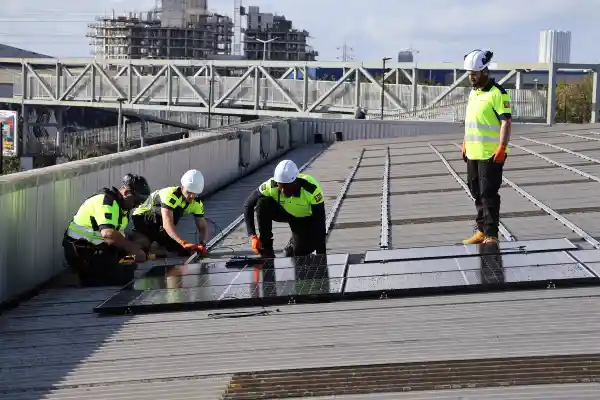
The UK Industrial Strategy (IS-8), updated in Q3 2025, has emerged as a cornerstone policy for revitalising Britain’s economy through sustainable industrial growth, innovation, and high-value job creation. With over £250 billion in investment commitments and 45,000 new jobs announced between July and September 2025, the Strategy represents not only economic renewal but also a fundamental revaluation of the UK’s skilled trades ecosystem.
This white paper explores how the Industrial Strategy is driving unprecedented demand for electricians and technical trades, analysing the intersection of policy, infrastructure investment, and vocational education. It also outlines key policy recommendations to ensure the UK develops the workforce capacity needed to sustain this growth.
The government’s IS-8 framework identifies eight priority sectors, including Clean Energy Industries, Advanced Manufacturing, Digital & Technologies, and Defence. Within each lies a critical dependency on electrical expertise, from low-carbon energy systems to smart digital infrastructure.
These figures underline a tangible shift towards high-value industrial activity, particularly in sectors reliant on electrification, energy efficiency, and digitalisation.
Each initiative represents a multiplier effect for the electrical workforce, from design engineers to on-site installation specialists.
| Investor | Company | Project | Value (£million) |
|---|---|---|---|
| British Business Bank | NRG Therapeutics | Support to accelerate treatments for neurodegenerative diseases | 8 |
| British Business Bank | Cyted Health | Support for expansion of early cancer detection technologies | 5 |
| British Business Bank | Salica Investments | Has raised £150 million to provide debt to high-growth companies with a regional focus across the UK in software, IP-rich hardware and advanced manufacturing sectors | 30 |
| British Business Bank | Blueskytec | South West Investment Fund support to scale cybersecurity hardware for critical national infrastructure projects | 1.5 |
| National Wealth Fund | Fidra Energy | Equity investment as part of £1 billion capital raise to fund the construction of battery storage facility at Thorpe Marsh, South Yorkshire | 200 |
| National Wealth Fund | Eelpower | Equity commitment alongside Equitix and Aware Super to invest £500 million in a new UK battery storage platform, Eelpower Energy | 200 |
| UK Export Finance | Jaguar Land Rover | Export Development Guarantee to bank expected to enable loan facility to support its supply chain following a recent cyber-attack | 1,500 |
| UK Export Finance | Ford | UK Export Finance enabled finance support for global transformation and manufacture of smart, connected and electrified vehicles | 1,000 |
| UK Export Finance | SRT Marine Systems | Finance provided to SRT buyers to secure export contracts for advanced maritime surveillance systems to coastguards in Indonesia and Kuwait | 305 |
The IS-8 update formally acknowledges shortages in technical occupations. The Temporary Shortage Occupation List (TSOL) now includes electricians, vehicle mechanics, data analysts, and lab technicians, enabling eased visa restrictions and accelerated recruitment.
However, domestic training remains the most sustainable response. Current ONS data show employment in industrial sectors plateauing at 7.21 million workers, despite rising GVA. This divergence highlights an emerging skills deficit that must be addressed through targeted training expansion.
Forthcoming initiatives include:
These initiatives directly complement private training providers such as Learn Trade Skills (LTS), which are already delivering accredited qualifications aligned with government workforce priorities.
Industrial Strategy sectors are actively supporting investment into the UK economy, including:
| IS-8 Sector | Investor | Project | Value (£million) | Jobs |
|---|---|---|---|---|
| Cross-sector | Blackstone | Pan-sector, 10-year commitment, including AI and data centres | 100,000 | Not public |
| Advanced Manufacturing | Walsin Lihwa | Superalloy forging facility focused on producing speciality steel and nickel parts | TBC | 200 |
| Clean Energy Industries | EDF, Centrica, La Caisse, Amber Infrastructure | Sizewell C nuclear power plant, supported by National Wealth Fund | 38,000 | 10,000 |
| Clean Energy Industries | Iberdrola | Investment in transmission and distribution electricity networks over next 3 years | 17,500 | 8,000 |
| Clean Energy Industries | Sumitomo | 10-year commitment to key UK infrastructure and clean energy projects | 7,500 | Not public |
| Creative Industries | Sky Group | Expansion of film and TV studios in Sky Studios Elstree, with 10 new stages | 2,000 | 2,000 |
| Defence | Norwegian Government | 5 Type-26 frigates purchased from British shipbuilders, led by BAE Systems | 10,000 | 4,000 |
| Defence | Palantir | Defence innovation through AI-powered capabilities, includes making UK its European HQ | 1,500 | 350 |
| Digital and Technologies | Amazon | Includes 4 new fulfilment centres in Hull, Northampton, and the East Midlands | 32,000 | >4,000 |
| Digital and Technologies | Microsoft | AI infrastructure and operations across the UK | 22,000 | Not public |
| Digital and Technologies | Alphabet | Capital expenditure, R&D, and related engineering over the next 2 years | 5,000 | 8,250 |
| Digital and Technologies | Salesforce | Ongoing operations and establishing the UK as its European AI hub, backed by R&D teams | 1,400 | Not public |
| Digital and Technologies | AI Pathfinder | Delivering AI compute capacity beginning in Northamptonshire | 1,000 | Not public |
| Life Sciences | Prologis | Strengthen existing investments including Cambridge Biomedical Campus | 3,900 | Not public |
| Life Sciences | Convatec | New R&D hub in Manchester, as part of a broader $1 billion investment in the UK and US over next decade | 500 | Not public |
| Financial Services | Revolut | Expansion of UK operations including new global headquarters in London | 3,000 | 2,000 |
| Financial Services | Shinhan Bank | Commitment to the UK’s Financial Services sector including expanding London office | 2,000 | Not public |
| Financial Services | PayPal, Bank of America, Citi Bank, and S&P | Investments in Edinburgh, Belfast, Manchester and London | 1,250 | Not public |
At Learn Trade Skills, we recognise that policy is only as effective as the workforce delivering it. Our mission is to bridge the gap between industrial investment and individual capability, ensuring every learner graduates ready to contribute to the UK’s electrification agenda.
These pathways are accredited by City & Guilds, EAL, and LCL Awards, ensuring direct relevance to industry standards.
Our partnerships with employers across the clean energy, construction, and electrical contracting sectors allow graduates to enter the workforce seamlessly. Each qualification embeds practical learning, mirroring the competency frameworks outlined in the Industrial Strategy’s skills pillar.

The Industrial Strategy’s regional delivery plans emphasise distributed growth across the UK’s devolved regions.
The 2GW Peak Time Flexibility Challenge, launched under the R&D Missions Accelerator, demonstrates the integration of AI with electrical systems to manage grid demand. This evolution demands a workforce proficient in smart metering, EV infrastructure, and data-connected electrical systems — all key training areas within the 18th Edition and Part P curricula.
Expand assessor capacity and adopt digital verification for NVQ Level 3 portfolios to reduce qualification lead times. Current backlogs risk delaying workforce readiness.
Leverage Regional Growth Plans to co-fund technical training providers directly linked to major infrastructure projects, particularly in battery storage, nuclear, and renewables.
Launch national campaigns to reposition electrical and construction trades as critical to the UK’s net-zero transition, integrating trade careers into school guidance and adult reskilling frameworks.
A coordinated data platform linking ONS employment data, regional training uptake, and industry vacancies to enable dynamic workforce planning.
The 2025 Industrial Strategy is more than an economic plan; it is a workforce blueprint for the next decade. Its success hinges on the UK’s ability to train, certify, and deploy electricians and skilled tradespeople at pace and scale.
Institutions like Learn Trade Skills are integral to this mission. By embedding flexibility, accreditation, and industry alignment, LTS ensures that government investment translates into tangible career outcomes and economic resilience.
The future of Britain’s industrial growth will be wired, connected, and powered by its tradespeople. Ensuring they are trained, valued, and supported must remain a national priority.
Q1: What is the Industrial Strategy (IS-8)?
A 10-year policy framework identifying eight high-growth sectors, including clean energy, advanced manufacturing, and digital technologies.
Q2: Why are electricians central to this strategy?
Because electrification underpins nearly every industrial sector — from EV infrastructure to smart grids and nuclear energy.
Q3: What qualifications align with these opportunities?
Key qualifications include Level 2 & 3 Diplomas (2365), 18th Edition Wiring Regulations (2382), Part P Building Regulations (2393), Inspection & Testing (2391-52), and NVQ Level 3 (2357/2346).
Q4: How can policymakers and training providers collaborate?
By integrating training delivery with regional project pipelines, incentivising private providers, and maintaining rigorous accreditation standards.
Q5: What outcomes can be expected by 2030?
A projected 20–25% increase in skilled electrical employment, underpinned by over £86 billion in government R&D funding and sustained industrial investment.
Tolga Aramaz is the Director of Learn Trade Skills (LTS), a family-run training centre specialising in electrical installations. With years of experience and a deep understanding of the electrical industry, Tolga is known for their exceptional organisational skills, attention to detail, and commitment to delivering outstanding results. They provide valuable insights and guidance to electricians, contractors, and businesses, ensuring compliance with industry regulations and safety protocols. Through engaging training programmes and consultancy services, Tolga empowers professionals to excel in their roles, fostering long-term relationships built on professionalism and customer satisfaction.
“Lorem ipsum dolor sit amet, consectetur adipiscing elit. Ut pretium tristique purus nec consectetur. Nulla feugiat eget tellus aliquam scelerisque. Sed eget luctus enim, sed mattis enim. Lorem ipsum dolor sit amet, consectetur adipiscing elit. Ut pretium tristique purus nec consectetur. Nulla feugiat eget tellus aliquam scelerisque. Sed eget luctus enim, sed mattis enim.Nulla feugiat eget tellus aliquam scelerisque. Sed eget luctus enim, sed mattis enim. Lorem ipsum dolor sit amet, consectetur adipiscing elit. Ut pretium tristique purus nec consectetur. Nulla feugiat eget tellus aliquam scelerisque. Sed eget luctus enim, sed mattis enim.”
William Goss
Electrician course
11/11/2024